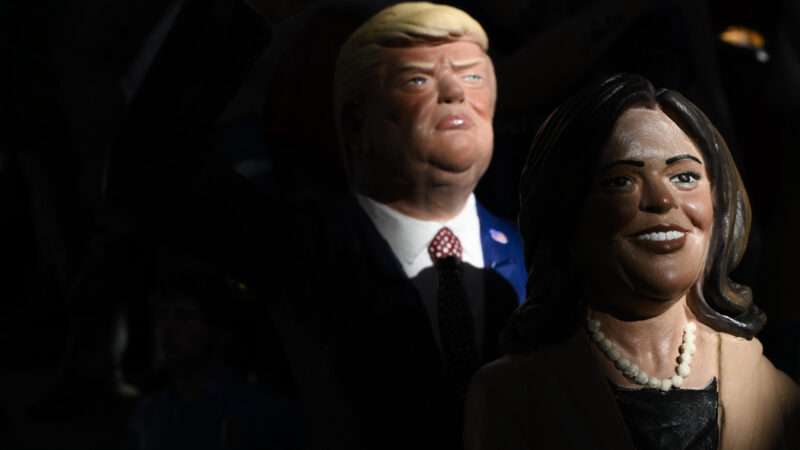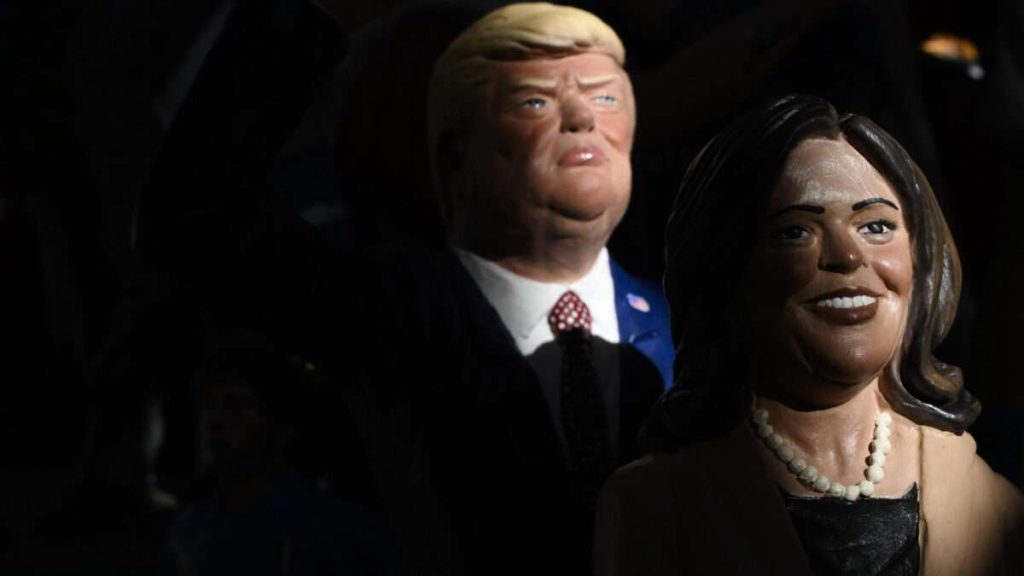
It’s going to be a bad election for sex and for tech. I don’t need some sort of 2024 election-results crystal ball to make that prediction confidently. Donald Trump and Kamala Harris both have a history of bad moves in these realms, and they both have a stable of supporters itching for them to make even worse moves going forward.
Who would be worse, from a libertarian perspective? Well…
Trump Would Be Worse on Sex Policy
Let’s start with sex.
Harris has a history of cracking down on sex work and opposing its decriminalization. She was a big advocate for weakening Section 230—the federal communications law that, among other things, helps protect web platforms from some liability for user content—in order to go after platforms that allow sex-work ads. She routinely spread falsehoods about the sex-work-friendly classifieds platform Backpage and, as attorney general of California, she twice arrested its founders on absurd pimping charges that a federal judge twice rejected. Later, as a senator, she was one of the co-sponsors of the law that would become FOSTA, which made life more difficult for sex workers and seriously chilled all sorts of sexuality-related content online. Harris also has a history of spreading sex trafficking panic, including passing off a fake sex-trafficking story as reality.
Trump signed FOSTA into law. He represents a party for which an influential core wants to outlaw pornography, and members of that party have a scheme to do so through the “back door” route of age-verification laws. He has repeatedly spread falsehoods about sex trafficking at the Southern border and sex trafficking by undocumented immigrants, and his supporters have promulgated some absolutely nuts sex-trafficking conspiracy theories, such as QAnon. Trump also represents a party that’s full of people trying to define all sorts of LGBTQ content as “harmful” to minors and restrict access to it on those grounds.
All of that being said, neither Harris nor Trump seems personally animated by broad hostility to sex work, LGBTQ people, sex workers, or sexuality generally. For both, any attacks on these things have seemed more opportunistic than ideological. Harris used what was then a hot-button issue of sex work ads and Backpage to get national attention. Trump uses an alleged epidemic of sex trafficking across the border to further his anti-immigration agenda. And so on.
This is not great, by any means; indeed, I would call it pretty despicable. But it is qualitatively different—and bodes slightly better for sex policy—than situations in which politicians seem driven by deep personal or ideological revulsion toward sex in the public sphere.
If I had to speculate, I’d say Trump probably has less dangerous personal convictions on this front, since Harris does seem to truly harbor some paternalistic attitudes toward sex workers.
But Trump is almost certainly more of a threat to sane sex policy than is Harris, simply owing to the fact that he represents the Republican Party. Hysteria surrounding sex is definitely a bipartisan phenomenon, but conservatives are still leaps and bounds worse on this front. And Trump, while politically idiosyncratic on some things, has a tendency to fall prey to some of the weird fixations of people around him. In any event, I find it unlikely that he would, say, veto an attempt at federal age verification for porn platforms or restricting books about sex in libraries should a GOP-controlled Congress send it his way.
And if we broaden our focus here to include things like contraception and abortion in the realm of sex policy, a Trump presidency looks even worse. Harris has some bad ideas about who should pay for condoms and other forms of contraception, and that could drive up costs. But on balance, a Harris presidency would be generally good for reproductive freedom.
A Trump presidency would not. While Trump may not have a personal desire to ban abortion nationwide (he has a checkered history on this), to restrict access to mifepristone, or to make it harder for people to access contraception or assisted reproduction, he’s infinitely more likely both to appoint judges who are sympathetic to some or all of these things, and to sign into law bills restricting reproductive freedom.
With Tech, It’s Harder To Say Who’s Worse
Let’s move on to tech policy and, by extension, speech policy.
Both Harris and Trump represent parties itching for more tech regulation. Both Republicans and Democrats want to use the federal government to “break up” big tech companies. Both parties seek more control over online speech. And both the Biden/Harris administration and the former Trump administration have a history of attacking Section 230, attacking TikTok, and generally acting with hostility toward popular and/or free-speech-enabling technologies.
This is especially worrying in light of the fact that the president actually can have a significant effect on tech policy, in terms of who he or she appoints to agencies such as the Federal Trade Commission (FTC) and the Federal Communications Commission (FCC) and in terms of executive orders that tell federal agencies to prioritize certain sorts of rulemaking and enforcement.
President Joe Biden’s FTC has been incredibly hostile toward tech companies, driven by Chair Lina Khan’s personal antitech antitrust agenda. And while it’s not a given that Harris would keep Khan around, Harris has so far declined to indicate otherwise—even in the face of some Democratic bigwigs urging her to do so. “On calls with her staff and at fundraisers, deep-pocketed donors have repeatedly named Khan…as impeding the technology sector and other lucrative parts of the economy,” Bloomberg reported in September. But “no clear communication has been given to donors about Harris’ position on Khan.”
The Trump administration was also bad in the area of bringing dubious antitrust actions against tech companies, but it was nowhere near as prolific at this as Democrats have been in recent years. I think a Harris FTC is more a tech threat than a Trump FTC.
The slight upside for Harris here is that, being from California—and particularly the San Francisco Bay Area—she has a lot of support tied up in the tech industry and faces pressure not to continue policies that could harm it.
Meanwhile, Trump has a whole history of bad actions related to tech. He wanted the FCC to undermine Section 230. He urged Congress to pass legislation limiting or abolishing Section 230. He tried to kill TikTok. And while he has since reversed himself on that, it’s unclear whether this represented a genuine change of heart or was just an attempt to slag Biden, who signed an anti-TikTok bill into law.
Trump has truly authoritarian instincts when it comes to media and online platforms he doesn’t like—showcased most recently in his comments about taking away broadcast licenses from TV news outlets that he thinks are too partisan. I have no doubt that a Trump 2.0 presidency would result in extreme attempts to quash free speech and internet freedom via executive and regulatory actions.
But Democrats have no particular love for free speech online either. Democrats broadly, and the Biden/Harris administration in particular, have a history of attacking online speech under the auspices of limiting “misinformation” or “hate speech” (two categories that lend themselves to vague and opportunistic definitions—and that are generally protected by the First Amendment). I don’t think any sensible observer would describe Harris as a great champion of free speech, online or otherwise.
Trump has worse impulses on issues surrounding speech and tech, and he will try to enact worse policies. The upside here is that his attempts on this front are often so over-the-top unconstitutional that they face a lot of legal and popular resistance. Perversely, they may be too bad to be a true threat.
A Harris administration is less likely to attempt moves regarding speech and tech that are so patently authoritarian they’ll obviously be rejected by regulators, courts, and members of her own party. But that might make her more dangerous on this front than Trump, because it will be a lot easier for Democrats to sell anti-tech and pro-censorship moves as simple matters of common sense and protection.
In effect, Trump will try more bad tech policies; Harris will get away with more of them.
More Sex & Tech News
• “I think we’re going to add a whole new category of content, which is AI generated or AI summarized content or kind of existing content pulled together by AI in some way,” Mark Zuckerberg reportedly said last week in a call with investors.
• AI is coming for fashion models.
• On “the broken promises of USB-C.”
Today’s Image

The post A Bad Election for Sex and for Tech appeared first on Reason.com.







